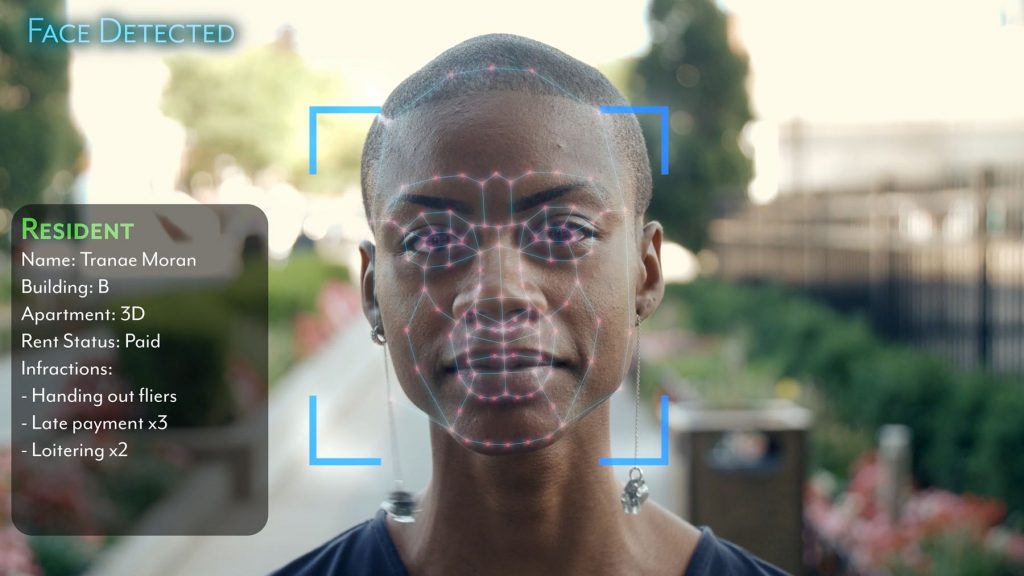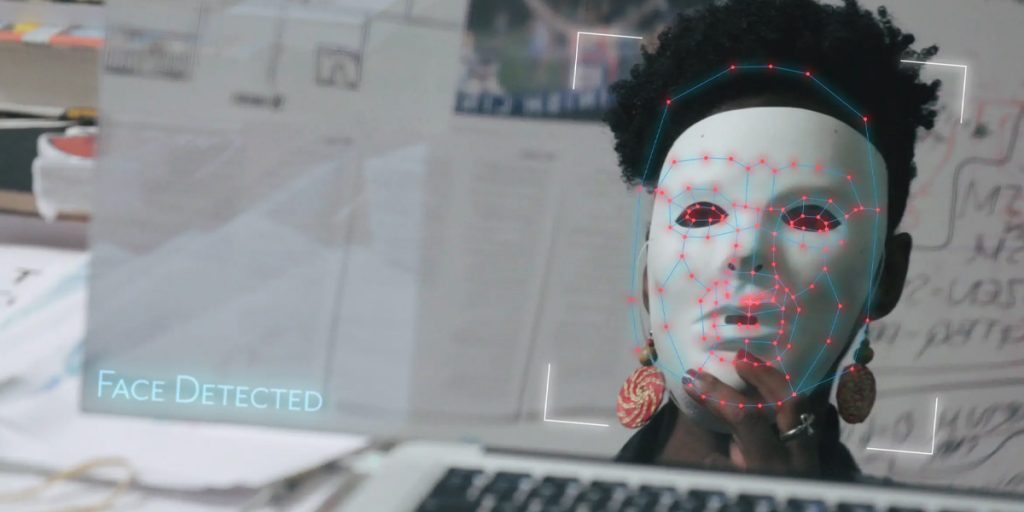Clear-minded and led by charismatic subjects, Coded Bias succeeds despite its shortfalls to offer a haunting takedown of AI evangelism.
Joy Buolamwini, computer scientist and AI researcher at the MIT Media Lab, is discussing the creation of the Aspire Mirror, a smart mirror that superimposes inspirational images such as a lion or Serena Williams over your face as you look into it. It’s an impressive, if simple, demonstration of the power of computer vision technologies, a field of rapidly increasing relevance in all walks of life, from surveillance and security to the more benign areas of arts and culture, and of particular interest to Coded Bias. However, the camera doesn’t seem to be detecting her face at all until she puts on a white mask, at which point the detector chirps approvingly. “When I put on the white mask, detected. I take off the white mask,” she demonstrates, as the neat, computerised display vanishes entirely from the screen, “…not so much.”
Joy’s mirror underscores the mission statement of Coded Bias. There remains an overriding, if somewhat uneasy, trust in machine learning systems as impartial and just, free from the unconscious biases that plague human decision-making. Through a series of case studies, director Shalini Kantayya unpicks these assumptions, clearly exposing the algorithms to which we entrust our lives as arbitrary and prejudicial.
All of these systems, we are repeatedly told, must make decisions based on the information we give them. Data is not impartial: it encodes the mistakes of the past and gives justification to their continuation. An algorithm that learns from biased data (say, for example, data from racially biased judicial systems that convict far more people of colour than white people) will replicate these biases – now, with the added unaccountability and lack of transparency of a computer.

Coded Bias eschews visual embellishment: outside of a couple of inter-cut sequences from 1984 or Blade Runner, the film is presented as straight-forwardly as this story can be told, and perhaps fortuitously – occasional cutaways are more absent-minded than emphatic. Kantayya’s selection of stories also belies, perhaps, an overenthusiasm in highlighting as many of these injustices as possible, rather than a more streamlined and in-depth examination. Her subjects are diverse and charismatic, each retelling different stories of algorithmic oppression, from the Met Police’s controversial facial recognition trials in London to Tay, a Microsoft Twitter bot that, within hours of its activation, began to spout increasingly shocking misogynistic and antisemitic rhetoric. Occasionally, the film feels bloated by its broadness, attempting to fit so many stories into a snug 90-minute runtime, but this excess is forgotten when the movie hits its emotional punches, switching its gaze to victims, rather than advocates. A sequence with Texan schoolteacher Daniel Santos, deemed ‘ineffective’ by the school board’s assessment system despite multiple awards, is especially touching and rage-inducing.
Kantayya’s previous focus on international human rights also arises to demonstrate a remarkable gift in asking questions of specific discomfort to a western audience. China’s social credit system is often the bogeyman that privacy activists in Europe and North America refer to when describing the worst possible outcome, the maximally dystopian endpoint of our technological trajectory. Coded Bias successfully navigates a remarkably difficult balancing act in exploiting this fear to ask deeper, more biting questions of the trust we have in our own corporate institutions, while still condemning these other breaches of privacy. The Chinese system is, at the very least, transparent and open about the data it collects, and the reasoning behind the decisions it makes: why does this scare us more than the unknowable power of Silicon Valley?
Overall, Coded Bias attacks its subject with a greater ferocity and purpose than the myriad tech documentaries of the past several years, absent of the somewhat distracting melodrama of The Social Dilemma or the self-aggrandisation of The Great Hack. When we consider what documentaries of this breed are aiming to do – educate and incite to action – it’s evident that Coded Bias is a rampant success. Its breadth perhaps recommends it as an introduction to the subject, rather than a deeper analysis, and its ending is somewhat over-optimistic in the face of acknowledgement of its own powerlessness. Nonetheless, as a myth-busting tool that rapidly exposes the cracks in Silicon Valley evangelism, it deserves as many eyes on it as possible.
Coded Bias is now available to watch on Netflix.

